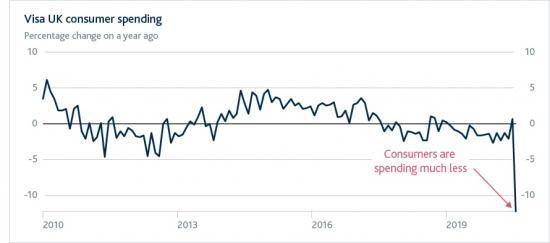Bank Of England - Monetary Policy Report And Interim Financial Stability Report - May 2020
9th May 2020

The Bank has published its quarterly Monetary Policy Report alongside an interim Financial Stability Report. Together, they provide a scenario for the path of the UK economy in the light of Covid-19 and assess the financial system's resilience to that scenario.
Our role is to ensure UK monetary and financial stability. We set interest rates to influence spending in the economy and to ensure inflation (the pace of price rises) returns to our 2% target sustainably. Low inflation supports jobs and growth. We ensure the UK financial system is resilient to, and prepared for, the wide range of risks it could face - so that the system can serve UK households and businesses in bad times as well as good.
Covid-19 and the measures to contain its spread are dramatically reducing jobs and incomes in the UK. They have also put a big strain on UK businesses' cash flow.
We have put in place a package of measures that will support households and businesses, help the economy recover and keep the financial system safe and stable.
Since January, we have cut interest rates and injected a further £200 billion into the UK economy through quantitative easing. That reduces the costs that some households and businesses face and will help the economy to recover.
We are helping banks to expand lending. We reduced the amount of their own financial resources (called capital) that banks and building societies need to make loans to UK businesses and households. Supported by our actions, and by Government and Bank of England lending schemes, the UK financial system can help businesses deal with financial difficulties by refinancing existing loans and by extending new loans.
We have tested the major UK banks. This has shown that they are strong enough to continue lending during this period of severe economic disruption. By expanding lending, banks will support the economy and limit losses to themselves.
We will continue to monitor the economic and financial situation closely, and whether households and businesses can get the credit they need. We stand ready to take further actions to help the economy recover, ensure that inflation returns to our 2% target, and support financial stability.
Covid-19 is dramatically reducing jobs and incomes in the UK
Social distancing measures are in place in the UK to stop the spread of Covid-19.
As a result, many businesses are unable to produce or sell their goods and services.
It also means that many households have less money coming in. Some people are working fewer hours and others have lost their jobs.
The latest surveys of UK businesses suggest that the fall in output has been large. Spending by consumers has also fallen very sharply.
This disruption will be temporary.
As the social distancing measures are lifted, the economy will recover.
We are supporting households and businesses, by keeping interest rates low...
We have put in place a package of measures to support households and businesses.
We have cut interest rates to 0.1%.
Lower interest rates mean cheaper loans for businesses and households. That reduces the costs they face.
We are helping banks and building societies to pass this cut on to you by offering them long-term funding at interest rates at, or close to, 0.1%.
We are also injecting a further £200 billion into the UK economy to help it recover through quantitative easing. This mainly involves us buying large quantities of government bonds. When we do this, the interest rates or ‘yields' on those bonds go down. This also helps to keep the interest rates on mortgages and business loans low.
...and helping banks to expand lending.
Businesses and households will need to borrow to get through this period. We want banks and building societies to expand lending. We have tested the major UK banks. They are strong enough to keep lending, which will support the economy and limit losses to themselves.
We are offering more long-term funding to banks that increase their lending.
In particular, we will give extra funding to banks that offer more lending to small and medium-sized companies. These firms often need more support in times like these.
We have also reduced the amount of financial resources (called capital) that UK banks and building societies need to set aside when they offer loans to UK businesses and households.
It will support up to £190 billion of bank lending to businesses.
To put that into context, it's more than 13 times the net amount businesses borrowed from banks throughout the whole of 2019.
This will help the economy recover and keep the financial system safe and stable
Our measures will help the economy recover and keep the financial system safe and stable.
We are working closely with the Government so we can co-ordinate what we do and make sure it has maximum impact.
For example, we are supporting large businesses and their workers by offering them loans for up to twelve months. This will help them to keep paying wages and their suppliers, even if they have serious cash flow problems.
The Government is also paying part of some people's wages to help businesses avoid redundancies. This will help them get back up and running when the disruption is over.
To read more and see several detailed reports go to -
https://www.bankofengland.co.uk/report/2020/monetary-policy-report-financial-stability-report-may-2020
